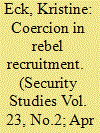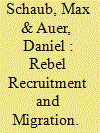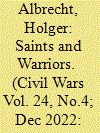| Srl | Item |
| 1 |
ID:
132395


|
|
|
|
|
| Publication |
2014.
|
| Summary/Abstract |
Previous research on rebel recruitment has focused on the economic and social incentives groups used as enticements but has overlooked the question of why many armed groups recruit using coercion. The puzzle is why coercion occurs despite its alienating civilian populations and being costly in terms of organizational and military effectiveness. I suggest that recruitment is a dynamic process and that groups are likely to shift recruitment strategies depending on the exigencies of the conflict. In particular, the exposure of the group to military and economic shocks accompanied by shortened time horizons should lead to increasingly coercive recruitment. Whether forced recruitment is a durable solution for a group in the long run is likely to be contingent upon the group's ability to induce a high level of compliance from the individual at a low cost. Further, in order to circumvent costs vis-à-vis the civilian population, the group must be able to restrict defection to the government and the out-migration of the civilian population. Three narratives from Nepal, Ethiopia, and Sierra Leone are provided both to illustrate the arguments and to probe the scope conditions. The article concludes that understanding why and when rebel groups use forced recruitment has vital security implications for the countries in which armed conflict takes place.
|
|
|
|
|
|
|
|
|
|
|
|
|
|
|
|
| 2 |
ID:
107920


|
|
|
|
|
| Publication |
2011.
|
| Summary/Abstract |
Most aid spending by governments seeking to rebuild social and political order is based on an opportunity-cost theory of distracting potential recruits. The logic is that gainfully employed young men are less likely to participate in political violence, implying a positive correlation between unemployment and violence in locations with active insurgencies. The authors test that prediction in Afghanistan, Iraq, and the Philippines, using survey data on unemployment and two newly available measures of insurgency: (1) attacks against government and allied forces and (2) violence that kill civilians. Contrary to the opportunity-cost theory, the data emphatically reject a positive correlation between unemployment and attacks against government and allied forces (p < .05 percent). There is no significant relationship between unemployment and the rate of insurgent attacks that kill civilians. The authors identify several potential explanations, introducing the notion of insurgent precision to adjudicate between the possibilities that predation on one hand, and security measures and information costs on the other, account for the negative correlation between unemployment and violence in these three conflicts.
|
|
|
|
|
|
|
|
|
|
|
|
|
|
|
|
| 3 |
ID:
193106


|
|
|
|
|
| Summary/Abstract |
We investigate whether the threat of recruitment by rebel groups spurs domestic and international migration. The existing literature on wartime displacement has largely focused on potential victims of violence. We argue that alongside potential victims, we should expect to see the out-migration of individuals who are attractive to the rebels as potential recruits. To test this hypothesis, we draw on original survey data collected in the context of the MFDC insurgency in southern Senegal. Causal identification stems from instrumenting recruitment threat with the density of the local forest canopy cover. Analyzing data from 3,200 respondents and over 24,000 family members, we show that individuals who fit the recruitment profiles of rebel groups are more likely to leave and be sent away by their families. Our paper contributes micro-evidence for a mechanism linking violent conflict to migration, which so far has received scant attention, and provides a deeper understanding of the composition of refugee flows.
|
|
|
|
|
|
|
|
|
|
|
|
|
|
|
|
| 4 |
ID:
188709


|
|
|
|
|
| Summary/Abstract |
This article explores how rebel groups come into being and how they sustain their activities. Its core premise is that the strategies used in rebel recruitment are crucial for such organisations. Knowing how rebel groups attract members will tell us why they are strong and, by extension, who is getting the upper hand in violent domestic conflicts. Drawing on empirical findings from the Syrian civil war, the article unpacks strategic choices in rebel recruitment: successful rebel groups benefit from the recruitment of combat-ready fighters (warriors) at the time of their inception and of high-commitment rebels (saints) amid sustained insurgent activities.
|
|
|
|
|
|
|
|
|
|
|
|
|
|
|
|